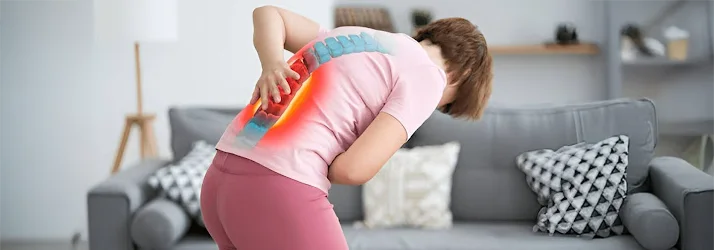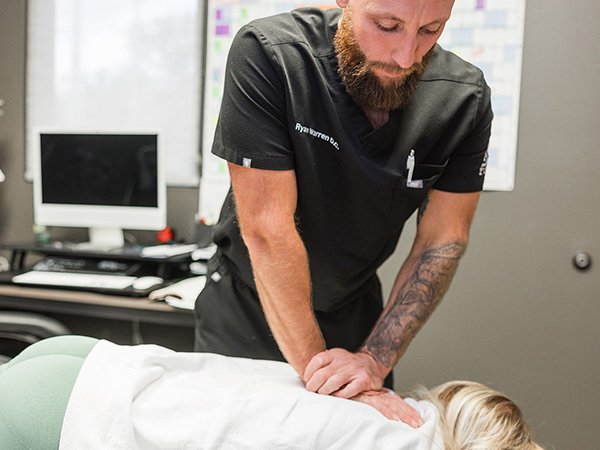Fayetteville AR Chiropractor Discusses Slipped Disc

Are you suffering from frequent episodes of lower back pain which makes simple activities like bending or stretching your body a challenge? While there are many causes of back and neck pain, it can also be a sign of a slipped disc. Approximately 2% (around 7 million) of the American population suffers from slipped disc or spine hernia annually (1). Today, we are highlighting some important aspects- symptoms, risk factors, and effective treatment options discussed by an expert Chiropractor in Fayetteville AR. Let’s begin!
What Is A Slipped Disc in Fayetteville AR?
A slipped disc is a medical condition in which one or more of the small bones (vertebrae) in your spine shift from their place, putting excessive pressure on the nerves in the surrounding area. A dislocation of these vertebrae causes the rubbery and gel-like structure in between the vertebrae to protrude and rupture, causing immense pain. The rubbery and gel-like structure present between two vertebrae acts as a shock absorber and assists in movement. Though a slipped disc may occur in any part of your spine, the two most common sites are- lower back (lumbar spine) and neck (cervical spine). A ruptured or herniated disc can negatively impact movement, posture, and quality of life.
Types Of A Slipped Disc
A slipped disc can show up in any form, depending on the type and site of disc damage. Some common types of slipped discs are as follows:
- Protrusion Slipped Disc
Protrusion slipped disc is the most common type of slipped disc. It occurs when a disc or rubbery structure between two bones in the spine protrudes out into the spinal canal without rupturing its outer layer (annulus fibrosus). - Extrusion Slipped Disc
An extruded disc is one in which the nucleus material of the disc breaks through the outer lining but remains within a disc. A difference between protrusion and extrusion is identified by studying the shape and position of a herniated or slipped disc in the spine. - Sequestration
Sequestration is a severe form of disc hernia where the nucleus of a disc separates from the outer layer and floats in the spinal canal. This free-floating nucleus compresses the surrounding nerves and causes extreme pain, soreness, and discomfort. - Bulging Disc
A bulging disc is synonymously compared with a slipped disc, but they’re a bit different! A bulging disc is a type of spine disc issue where a disc bulges out around its entire circumference. A bulge in the disc denotes a generalized expansion rather than a local herniation.
Symptoms Of Slipped Disc
Symptoms of slipped discs vary depending on the type, location, and severity of the problem. The symptoms may aggravate during movement and alleviate during the period of rest. Here are a few common symptoms of a slipped disc:
- For Herniated Lumbar Disc:
- Back Pain- People suffering from a herniated lumbar disc often experience severe pain in the lower back.
- Sciatica Nerve Pain- A rupture in the lumbar disc may lead to sciatica nerve pain which is characterized by a sharp shooting pain that radiates from one side buttocks into the leg.
- Tingling or Numbness- A slipped disc in the lower section of your spinal cord may cause feelings of tingling, numbness, and soreness.
- Muscle Weakness- People suffering from herniated discs (or slipped discs) often complain about weakness in muscles/ legs (2).
- For Slipped Cervical Disc In The Neck:
- Shoulder Pain- People suffering from slipped cervical discs in the neck regions are likely to experience pain near or between shoulder blades. The pain can radiate to the shoulder, arms, wrist, and fingers in some cases.
- Neck Pain- Pain and discomfort in the neck and surrounding regions is a common sign of a slipped disc in the cervical spine.
- Limited Movement- Cervical pain may aggravate moving or turning the neck.
Causes & Risk Factors Of Slipped Disc
Slipped disc or disc herniation gradually occurs with the wear and tear linked with growing age. It is known as disc degeneration. As you age, the discs in your spine are likely to become susceptible to gradual wear and tear due to everyday activities and movements (3).
Identifying the exact cause of a slipped disc is difficult for many people. In some cases, the use of back muscles instead of thigh and leg muscles for lifting heavy weights may contribute to disc herniation. Additionally, improper twisting or bending while handling heavy objects may also lead to slipped discs.
Some other risk factors that may lead to slipping of the back disc include:
- Being overweight
- Genetics
- Occupational hazards
- Smoking
- Frequent driving
- Sedentary lifestyle
- Sports injuries
Slipped Disc Treatments
For individuals experiencing excruciating pain, using pain relief medications and following certain home remedies for slipped discs may come to the rescue. Chiropractic care is often recommended as an integral part of non-surgical treatments for slipped discs. Let’s explore.
- Medications- Commonly, over-the-counter pain medications such as acetaminophen, ibuprofen, or naproxen are advised to relieve pain in people suffering from herniated discs. Also, some neuropathic drugs, muscle relaxers, and opioid medications may be prescribed by a licensed medical practitioner depending on the severity of the illness.
- Chiropractic Care- Chiropractic care is one of the most popular and effective treatment plans for people suffering from slipped discs. Chiropractic therapies are scientifically designed to improve posture, limit pressure on surrounding nerves, improve flexibility and induce pain-free movement without undergoing surgery. However, you should receive chiropractic care from a licensed chiropractor for effective and safe results. Apex Spine Joint & Wellness Centre in Fayetteville, AR is a leading name in the city for providing comprehensive therapies for slipped discs. People are advised to receive chiropractic therapies along with taking oral medications for fast and better results.
- Surgery- While surgery is rarely required for herniated discs, it becomes a necessity when non-surgical treatment options prove to be ineffective in chronic cases.
Conclusion
A slipped disc is a medical condition characterized by protruding, ruptured, or bulging discs in the spine. This painful condition not only leaves you in discomfort but makes doing everyday activities like bending, twisting, or walking a challenge. While pain-relievers and over-the-counter drugs provide temporary relief from pain and discomfort, alternative therapies may help cure the condition. Chiropractic therapies work together to address spinal health holistically, eliminating the need for surgical treatments.
Sources and References
- https://www.ncbi.nlm.nih.gov/books/NBK441822/
- https://pmc.ncbi.nlm.nih.gov/articles/PMC3489344/
- https://pubmed.ncbi.nlm.nih.gov/12480218/
- https://www.kauveryhospitalsbangalore.com/blog/slip-disc
- https://www.maxhealthcare.in/blogs/all-about-slip-disc-disease
- https://www.chiropractic-in-malaysia.com/blog/best-slip-disc-treatment
- https://www.manipalhospitals.com/yeshwanthpur/blog/all-you-need-to-know-about-slipped-disc-and-its-treatment-options/
- https://regenorthosport.in/orthopedics/blog/alternative-treatments-for-slipped-discs-what-works-and-what-doesnt/





